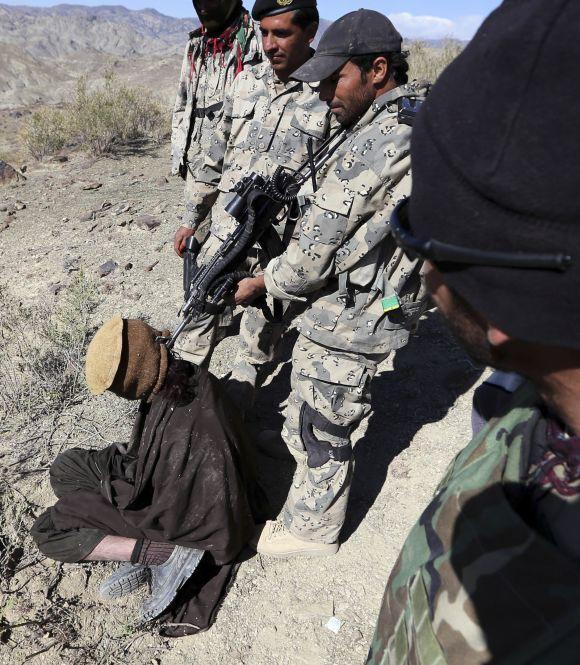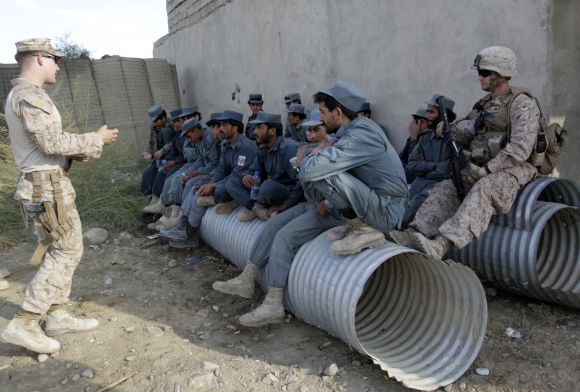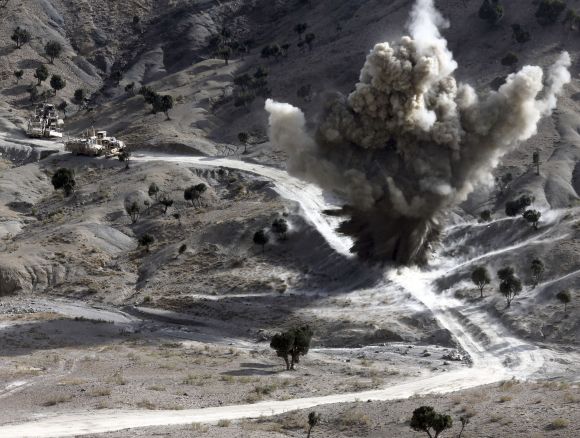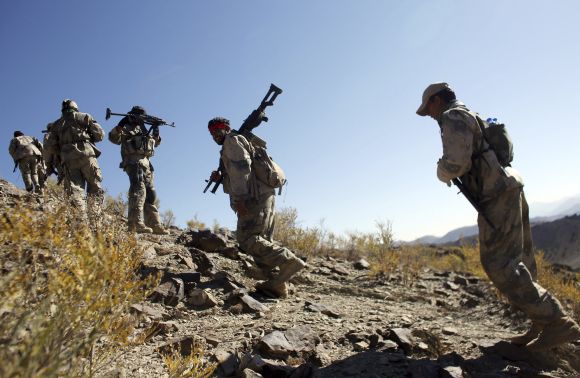Photographs: Goran Tomasevic/Reuters Vicky Nanjappa in Bengaluru
Vanni Cappelli, an expert on Afghanistan from Poughkeepsie in New York state, is the president of the Afghanistan Foreign Press Association and a freelance journalist.
In an interview to rediff.com's Vicky Nanjappa, Cappelli says that in the absence of America coming to its senses, India, together with Russia, would have to shoulder the military and economic burden of shielding Afghanistan from Pakistani aggression.
What are your thoughts on the situation in Afghanistan today?
The situation is critical. Afghanistan is under attack from proxy militants who are beholden to the military-security services complex based in Rawalpindi that rules Pakistan. Since it remains a devastated land that is being destabilised by a much larger neighbour, it cannot withstand this pressure. The United States, which had a duty to shield the country from foreign aggression, is at least publically in denial of this, and seems determined to have done with the drama. The prognosis is for many more years of war.
Has the situation in Afghanistan deteriorated post September 11?
After a few relatively stable and hopeful years following the overthrow of the Taliban, Rawalpindi took advantage of America's absolutely unnecessary war against Iraq and the massive military assistance it received from Washington to relaunch the Taliban insurgency against the Kabul government. The situation has been deteriorating steadily since 2005, with the "surge" having only a temporary impact in certain areas.
...
'America wants to walk away from the problem it created'
Image: US Marine Corporal Anthony Woltz of Police Advisor Team, 2nd Battalion, 7th Marines Regiment gives a lecture on anti-terrorist tactics to police trainees during a basic police training course at Combat Outpost Musa Qal-Ah in Helmand province in southwestern AfghanistanPhotographs: Erik De Castro/Reuters
What suggestions would you make for the restoration of normalcy in Afghanistan?
As I proposed in my essay, 'Containing Pakistan: Engaging the Raja-Mandala in South-Central Asia', which was published in the winter 2007 issue of Orbis, America should break decisively with Pakistan and enter into a tripartite American-Indian-Afghan alliance aimed at containing that country. This would involve military cooperation between these nations, combined with an end to all military and economic aid to Pakistan, placing that country on the State Department list of State sponsors of terror, and the imposition of severe sanctions against it.
Given Pakistan's weak economy, it would be unable to continue committing aggression against its neighbours for much longer under those circumstances.
Bringing normalcy to Afghanistan would only be a step on the road to the larger goal of breaking the power of Rawalpindi and fostering real civilian rule in Islamabad. Only this way can lasting peace come to South-Central Asia, and the threat from extremism be neutralised.
A pullout by the United States would be welcomed by many, but is there a danger of the Taliban coming back to power?
There is a danger of the Taliban and allied extremists such as the Haqqanis and the forces of Gulbaddin Hekmatyar taking over large parts of the southern part of Afghanistan, but with sufficient aid from responsible governments there is a good chance that the line can be held at Kabul and the Hindu Kush.
What roles would India and Pakistan have to play for the restoration of peace in Afghanistan?
In the absence of America coming to its senses, India, together with Russia, would have to shoulder the military and economic burden of shielding Afghanistan from Pakistani aggression. Pakistan will never play a peaceful role in Afghanistan so long as it is ruled by the army, and the army is what it is -- an entity that uses alarmist religious propaganda and proxy Islamic extremists to crush socio-economic reform at home and expand its power abroad.
You say both Mitt Romney and Obama sidestepped the Afghanistan issue in their final (presidential) debate. Who according to you, the Republicans or the Democrats, would deal better with the situation in Afghanistan?
There are no indications at this time that either of them is capable of, or willing to, deal with a reality that requires so much effort to reverse almost 60 years of America's catastrophic pro-Pakistan policies in south-central Asia. As I have said, America wants to walk away from the problem it created -- but it did that in the 1990s, and the result was September 11. So we seem locked in a vicious historical circle.
...
'People in Afghanistan overwhelmingly see Pak as an enemy'
Image: US soldiers blows up a roadside bomb set up by Taliban fighters near the town of Walli Was in Paktika province, near the border with PakistanPhotographs: Goran Tomasevic/Reuters
What do the people of Afghanistan really want? Do they want US presence in their country?
The people of Afghanistan want peace, security, and economic development. They were willing to accept American presence if they delivered these things, but they did not. But they would still accept them if Washington announced that it was getting real about Pakistan.
You say that Afghanistan was made dependent on Pakistan by both the Bush and Obama administrations. What are the dangers for Afghanistan if they are Pakistan dependent?
Actually I said that those administrations made military victory dependent on Pakistan, which of course is oxymoronic since Pakistan is the real enemy; the font of Islamic extremism in South-Central Asia and the sponsors of the insurgency in Afghanistan.
Do the people of Afghanistan see Pakistan as an ally or an enemy?
They overwhelmingly see it as an enemy, and are exasperated at America's inability to come to this realisation -- even after the Pakistanis were caught hiding Osama bin Laden.
America has been accused of using more force than reason in Afghanistan. How much damage has been caused as a result of this?
Well, if you fight a war while providing billions of dollars to the nation that is fielding, supplying, and funding the people you are fighting against, you are unlikely to win it. In warfare, that is the ultimate damage.
...
'Containing Pakistan is the way to deal with the Taliban'
Image: Afghan border policemen patrol during an operation near Walli Was in Paktika province, near the border with PakistanPhotographs: Goran Tomasevic/Reuters
What role could Iran and China play in the restoration of normalcy in Afghanistan?
Iran could play a very positive role, but only in bilateral cooperation with India, since America is so hostile to it. China is trapped between the geostrategic logic of supporting Pakistan in order to encircle India and the fact that it fears the Islamic extremism that Pakistan fosters. Until China resolves this contradiction, it cannot play a positive role.
Do you think Afghanistan is still being used as a safe hideout by the Al Qaeda?
Minimally, compared to its presence in Pakistan. But if Pakistan imposes its proxies on parts of southern Afghanistan, the Al Qaeda will return there.
Some time back there was talk that the 'good Taliban' would be roped into the administration. Will this work?
It will not work so long as Pakistan continues to attack Afghanistan with the Taliban who continue to fight.
How does one deal with the 'bad Taliban' and how strong are they today?
One deals with the Taliban by containing Pakistan; they are only as strong as Rawalpindi makes them, and so you must weaken Rawalpindi.
Please ...





article